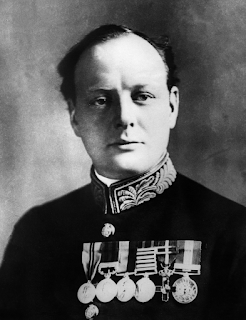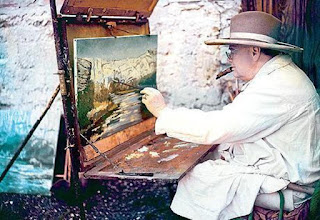A Promising Statesman
What were Winston Churchill's interests? The Punch magazine stated them accurately in a 1902 comic sketch, shortly after he had first entered Parliament: "the House of Commons—and its reform. The British Army—and its reform. The British Navy—and its reform. The Universe—and its reform."
From the very beginning of his political carrier, Winston Churchill set out to ameliorate everything he was able to. This exasperated a large number of people, but, luckily, others were open to reform. Regardless of if they supported him or not, quickly became clear to everyone that Churchill had ambitious plans, and few doubted that he wouldn't rise to a prominent position in the British government.
 |
| Churchill electioneering in Manchester, 1908. |
Despite this Begbie's optimistic prediction, it cannot be said that the general public always favored Churchill. Although many people encouraged Winston Churchill's political career, there always remained several politicians, even within his current party, who regarded him with disgust and contempt. Churchill's career took a turn for the worse when he argued for free trade in Great Britain. In one disheartening incident, all but twelve Tories walked out of the House of Commons while he was giving a speech on free trade.
As much as Winston Churchill respected tradition, he didn't hesitate to push for reform in areas that he thought needed improvement. Sometimes this cost him the price of political respect. During the free trade incident, even Harold Begbie wrote, "It must be admitted that Mr. Churchill is a very well-hated man in certain circles of Society." Thankfully, as harsh as the public was on him, Winston Churchill eventually recovered from the brutal free trade debate, and regained even more popularity than he had previously held. A similar occurrence would happen years later on a more intense scale: when Churchill would be fired from the Admiralty because of the disastrous Dardanelles Campaign. As Mark Twain once observed, history often rhymes. Churchill discovered this the hard way.
As much as Winston Churchill respected tradition, he didn't hesitate to push for reform in areas that he thought needed improvement. Sometimes this cost him the price of political respect. During the free trade incident, even Harold Begbie wrote, "It must be admitted that Mr. Churchill is a very well-hated man in certain circles of Society." Thankfully, as harsh as the public was on him, Winston Churchill eventually recovered from the brutal free trade debate, and regained even more popularity than he had previously held. A similar occurrence would happen years later on a more intense scale: when Churchill would be fired from the Admiralty because of the disastrous Dardanelles Campaign. As Mark Twain once observed, history often rhymes. Churchill discovered this the hard way.
Sources:
Young Titan by Michael Shelden
the Punch magazine archives.
Photo courtesy of the Manchester Evening News.



Comments
Post a Comment